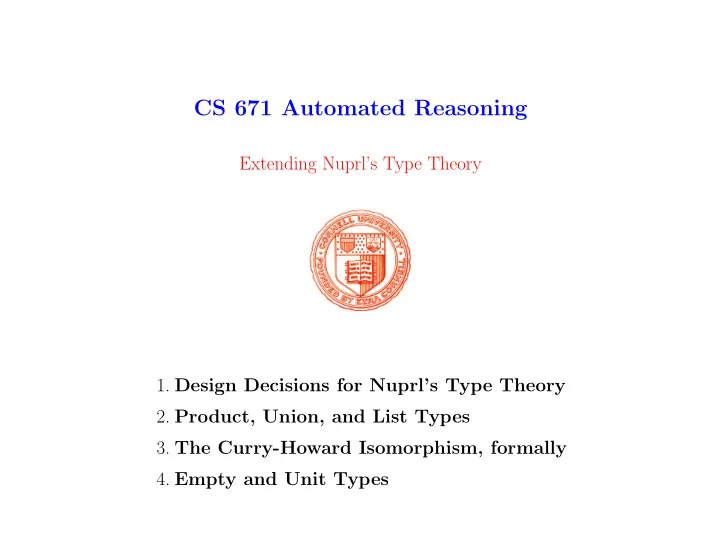

CS 671 Automated Reasoning Extending Nuprl’s Type Theory 1. Design Decisions for Nuprl’s Type Theory 2. Product, Union, and List Types 3. The Curry-Howard Isomorphism, formally 4. Empty and Unit Types
Design Decisions for Nuprl’s Type Theory • Syntax: – Expressions will be represented in a uniform term syntax – Term display is independent of the internal syntax • Semantics: – Semantics models proof, not denotation – Semantics is based on judgments and lazy evaluation of noncanonical terms – Judgments concern typehood, type equality, membership, and typed equality • Proof Theory: – Proofs proceed by applying sequent-style refinement rules – A judgment “ t is a member of T ” is represented as T ⌊ ext t ⌋ – Propositions are represented as types Basic propositions have Ax as only member – Typehood is represented by a cumulative hierarchy of universes See Appendix A of the Nuprl 5 manual for details CS 671 Automated Reasoning 1 Extending Nuprl’s Type Theory
Cartesian Products: Building Data Structures Syntax: Canonical: S × T , � e 1 , e 2 � Noncanonical: let � x , y � = e in u Evaluation: e ↓ � e 1 , e 2 u [ e 1 , e 2 / x, y ] ↓ val � let � x , y � = e in u ↓ val Semantics: · S × T is a type if S and T are � = � e 1 ’, e 2 ’ � in S × T if S × T type, e 1 = e 1 ’ in S , and e 2 = e 2 ’ in T · � e 1 , e 2 Library Concepts: e .1 , e .2 See Appendix A.3.2 and the library theory core 2 for further details CS 671 Automated Reasoning 2 Extending Nuprl’s Type Theory
Lists: Basic Data Containers Syntax: Canonical: T list , [] , e 1 :: e 2 Noncanonical: list ind ( e ; base ; x , l , f xl . up ) Evaluation: e ↓ [] base ↓ val list ind ( e ; base ; x , l , f xl . up ) ↓ val e ↓ e 1 :: e 2 up [ e 1 , e 2 , list ind ( e 2 ; base ; x , l , f xl . up ) / x, , l, f xl ] ↓ val list ind ( e ; base ; x , l , f xl . up ) ↓ val Semantics: · T list is a type if T is · [] = [] in T list if T list is a type · e 1 :: e 2 = e 1 ’:: e 2 ’ in T list if T list type, e 1 = e 1 ’ in T , and e 2 = e 2 ’ in T list Library Concepts: hd( e ) , tl( e ) , e 1 @ e 2 , length( e ) , map( f ; e ) , rev( e ) , e [ i ] , e [ i .. j − ] , . . . See Appendix A.3.10 and the library theory list 1 for further details CS 671 Automated Reasoning 3 Extending Nuprl’s Type Theory
Disjoint Union: Case Distinctions Syntax: Canonical: S + T , inl ( e ) , inr ( e ) Noncanonical: case e of inl ( x ) �→ u | inr ( y ) �→ v Evaluation: u [ e ′ / x ] ↓ val e ↓ inl ( e ’) case e of inl ( x ) �→ u | inr ( y ) �→ v ↓ val v [ e ′ / y ] ↓ val e ↓ inr ( e ’) case e of inl ( x ) �→ u | inr ( y ) �→ v ↓ val Semantics: · S + T is a type if S and T are · inl ( e ) = inl ( e ’) in S + T if S + T type, e = e ’ in S · inr ( e ) = inr ( e ’) in S + T if S + T type, e = e ’ in T Library Concepts: —— See Appendix A.3.3 for further details CS 671 Automated Reasoning 4 Extending Nuprl’s Type Theory
The Curry-Howard Isomorphism, formally Proposition Type P ∧ Q P × Q ≡ P + Q P ∨ Q ≡ P ⇒ Q P → Q ≡ ¬ P P → void ≡ ∃ x : T . P [ x ] x : T × P [ x ] ≡ ∀ x : T . P [ x ] x : T → P [ x ] ≡ Need an empty type to represent “falsehood” Need dependent types to represent quantifiers See the library theory core 1 for further details CS 671 Automated Reasoning 5 Extending Nuprl’s Type Theory
Empty Type void Syntax: Canonical: void – no canonical elements – Noncanonical: any ( e ) Evaluation: – no reduction rules – Semantics: · void is a type · e = e ’ in void never holds Library Concepts: —— See Appendix A.3.6 and Section 3 of the 1993 CS611 notes for further details Warning : rules for void allows proving semantical nonsense like or x: void ⊢ 0=1 ∈ 2 ⊢ void → 2 type CS 671 Automated Reasoning 6 Extending Nuprl’s Type Theory
Unit : one element type Syntax: Canonical: Unit , Ax Noncanonical: – no noncanonical expressions – Evaluation: – no reduction rules – Semantics: · Unit is a type · Ax = Ax in Unit Library Concepts: —— Defined type in Nuprl , see the library theory core 1 for further details CS 671 Automated Reasoning 7 Extending Nuprl’s Type Theory
Recommend
More recommend